ASRock Rack B550D4-4L Motherboard Review: B550 Goes Professional with BMC
by Gavin Bonshor on May 20, 2021 9:00 AM ESTCPU Performance, Short Form
For our motherboard reviews, we use our short form testing method. These tests usually focus on if a motherboard is using MultiCore Turbo (the feature used to have maximum turbo on at all times, giving a frequency advantage), or if there are slight gains to be had from tweaking the firmware. We put the memory settings at the CPU manufacturers suggested frequency, making it very easy to see which motherboards have MCT enabled by default.
For B550 we are running using Windows 10 64-bit with the 1909 update.
Rendering - Blender 2.79b: 3D Creation Suite - link
A high profile rendering tool, Blender is open-source allowing for massive amounts of configurability, and is used by a number of high-profile animation studios worldwide. The organization recently released a Blender benchmark package, a couple of weeks after we had narrowed our Blender test for our new suite, however their test can take over an hour. For our results, we run one of the sub-tests in that suite through the command line - a standard ‘bmw27’ scene in CPU only mode, and measure the time to complete the render.
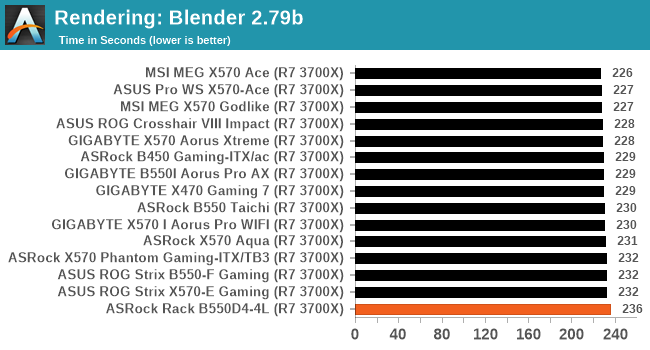
Rendering – POV-Ray 3.7.1: Ray Tracing - link
The Persistence of Vision Ray Tracer, or POV-Ray, is a freeware package for as the name suggests, ray tracing. It is a pure renderer, rather than modeling software, but the latest beta version contains a handy benchmark for stressing all processing threads on a platform. We have been using this test in motherboard reviews to test memory stability at various CPU speeds to good effect – if it passes the test, the IMC in the CPU is stable for a given CPU speed. As a CPU test, it runs for approximately 1-2 minutes on high-end platforms.
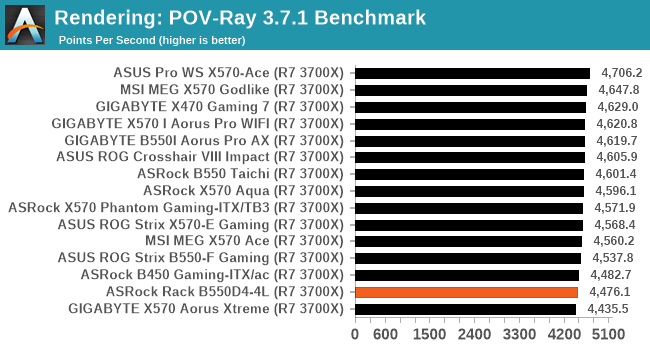
Compression – WinRAR 5.60b3: link
Our WinRAR test from 2013 is updated to the latest version of WinRAR at the start of 2014. We compress a set of 2867 files across 320 folders totaling 1.52 GB in size – 95% of these files are small typical website files, and the rest (90% of the size) are small 30-second 720p videos.
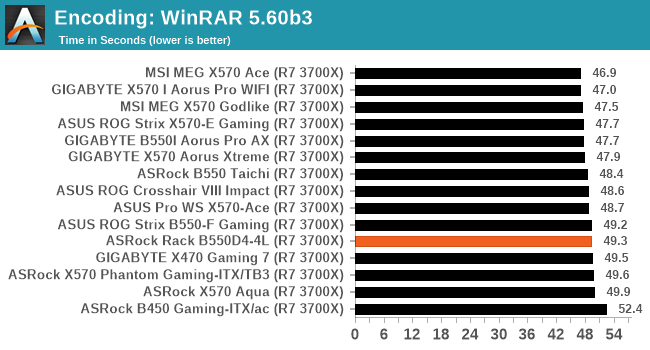
Synthetic – 7-Zip v1805: link
Out of our compression/decompression tool tests, 7-zip is the most requested and comes with a built-in benchmark. For our test suite, we’ve pulled the latest version of the software and we run the benchmark from the command line, reporting the compression, decompression, and a combined score.
It is noted in this benchmark that the latest multi-die processors have very bi-modal performance between compression and decompression, performing well in one and badly in the other. There are also discussions around how the Windows Scheduler is implementing every thread. As we get more results, it will be interesting to see how this plays out.
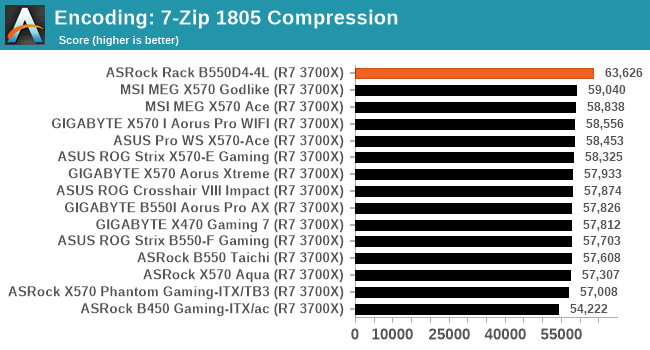
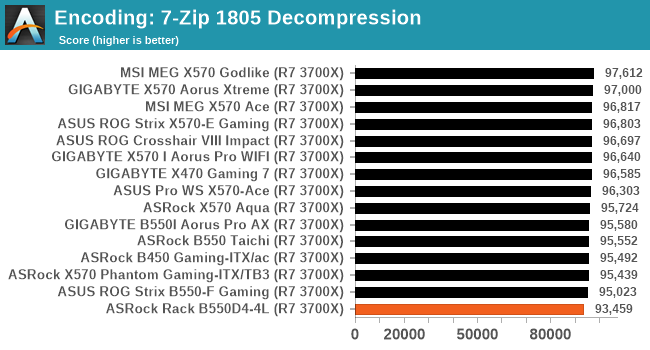
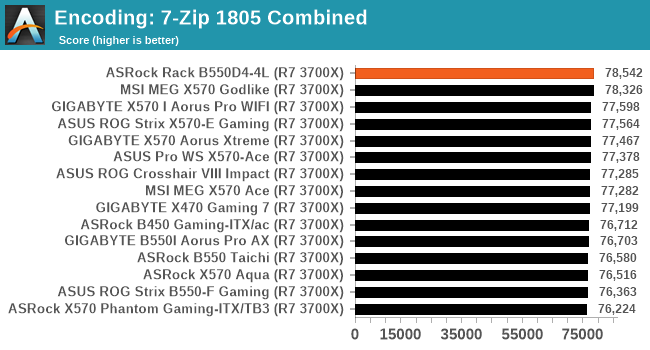
Point Calculations – 3D Movement Algorithm Test: link
3DPM is a self-penned benchmark, taking basic 3D movement algorithms used in Brownian Motion simulations and testing them for speed. High floating point performance, MHz, and IPC win in the single thread version, whereas the multithread version has to handle the threads and loves more cores. For a brief explanation of the platform agnostic coding behind this benchmark, see my forum post here.
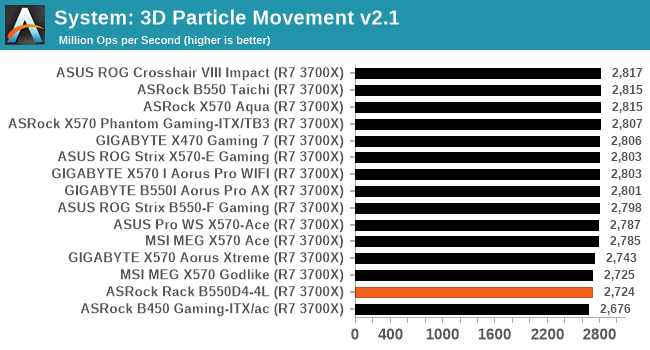










73 Comments
View All Comments
fmyhr - Thursday, May 20, 2021 - link
While this is true, AMD and motherboard manufacturers are distressingly cagey about whether ECC and ECC error reporting actually work. If you care about this, you need to do your own searches. There have been cases of ECC support being added or removed on successive motherboard BIOS revisions. The different mainstream mfgs have different attitudes regarding ECC RAM: MSI pretty much ignores it, Gigabyte says they support ECC on _some_ boards, Asus seems somewhat better, and ASRock appears to be the best bet. If only Supermicro would give us a non-Threadripper Ryzen board...AntonErtl - Friday, May 21, 2021 - link
AFAIK all ASUS (as well as all Asrock) boards support ECC. We have several servers with (working) ECC with Ryzen CPUs (without Pro): 1600X, 1800X, 3700X, 3900X, 5800X. If AMD sold the Pro models in retail and guaranteed ECC functionality, we would be willing to pay a little extra for that. As for the Pro models, I once compared the specification of one with the corresponding non-Pro model, and wrt ECC they were the same. Can anyone name a Pro model where AMD guarantees more ECC functionality?mode_13h - Friday, May 21, 2021 - link
The difference between ECC support of Pro and non-Pro CPUs is supposedly that AMD only tests and guarantees it on the Pros. For the non-Pro CPUs, it's up to the motherboard vendor to test and support.As for APUs, AMD disables ECC support on the non-Pro APUs. I guess that's because the main customers for APUs with ECC are corporations, and so it's like a favor to big OEMs, giving them a lock on the corporate market (since the Pro versions seem to be EOM-only).
mode_13h - Friday, May 21, 2021 - link
> EOM-onlytypo: should be OEM-only.
Slash3 - Friday, May 21, 2021 - link
Correct. The board does indeed support ECC in that way. Gavin misinterpreted the specifications; no idea why, as it is quite clear.https://www.asrockrack.com/general/productdetail.a...
"DDR4 288-pin ECC*/non-ECC UDIMM
* For AMD Ryzen Desktop Processors with Radeon Graphics, ECC support is only with Processors with PRO technologies."
Non-Pro APUs have always been the exception, and do not support ECC on any platform.
Jorgp2 - Friday, May 21, 2021 - link
>Uhh.. ECC memory works just fine with bog standard (aka "not Pro") Ryzen CPU's and has LITERALLY since their launch in 2017.I don't think you understand what kind of board this is.
If the data sheet says it only supports ECC for select SKUs, then it only supports ECC for select SKUs.
There is no halfway for the target market.
leexgx - Friday, June 18, 2021 - link
Ecc functionality still works even with the non-pro CPUs (just official stance is it doesn't work even thought it does, not like Intel where if its an i5 or higher ecc automatically doesn't work) ddr5 is going to change this problem with Intel as ecc is baked into ddr5 and can't be disabled and sold "as a enterprise" featureMeJ - Friday, May 21, 2021 - link
"The B550D4-4L also doesn't include integrated audio, so users looking to build an audio workstation will need to rely on external audio controllers."With respect, this comment is illogical. I have never heard of any DAWorkstation using on-board audio, and don't ever expect to. NOT having on-board audio to disable is a major advantage for a DAW. Also, the DPC issues here are perhaps characteristic of early drivers. There is no inherent reason I can see for this board to have worse performance than others with the same chipset... Is there? I agree that 10G would be preferred for a DAW.
mode_13h - Friday, May 21, 2021 - link
Lol. Yeah, integrated audio on server boards that even have it tends to be a minimal implementation, with lots of crosstalk and interference.mode_13h - Friday, May 21, 2021 - link
ASPEED BMCs are such garbage. This has the same ARM11 core as a first gen Raspberry Pi. Just imagine how slow software rendering is on such a core, and that's the graphics performance you get on these things.I have an ASRock board with one of these BMCs, and 2D graphics even feels slow at 1024x768 (which is the resolution that the EDID of my analog KVM seems to advertise, even though the monitor is higher).